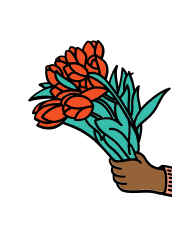A Beginner's Guide To Medicinal Mushrooms
Alright, today we’re talking mushrooms. The medicinal kind, not the magical kind (sorry to disappoint). But fear not – the history of therapeutic fungi is wild enough without the hallucinogens. So buckle up and join us on a trip.

Basically, if you pick up any ancient text you’re gonna see a bunch of folks chowing down on mushies. Take iceman Otzi, for example. This fella, who dates back to 3300 BCE and was found frozen in a glacier in 1991, is not only a scientific miracle but also a shroom aficionado.
When they discovered Otzi he had two different types of fungi in his pockets. One was a tinder fungus, used to hold warm coal to restart a fire, and the other was a birch polypore which was used to fight off parasites and infection.You see? Wild.
And it was the same all over the world. In ancient Egypt mushies were considered the food of immortality and were eaten by pharaohs and nobles; Mayan and Aztec cultures used them in healing shamanic settings; Chinese medicine has been prescribing fungi to treat respiratory illness since 100 BCE; heck even the Greek and Roman authors like Seneca and Pliny used to argue for their medicinal benefits.

Nowadays, you can nab a powdered lion’s mane or a bunch of shitake from the shelf at the local supermarket. But it’s not because Scotty from Marketing tacked on the word ‘superfood’ and now it’s trending. No – mushrooms, in a medicinal capacity, have been around for donkey’s years.
But is there any science to it? Well, medical research by Western standards isn’t quite up-to-date but there are still a heap of centuries-old health advantages attributed to different species of mushroom. The key is to think of medicinal mushies as immune boosters, rather than cure-alls. Which is kinda the way we look at most alternative medicines here at Moody HQ.
So if you’re keen to deep dive into the fungus life, here are five mushies to get around:
Reishi, the king of chill
Forget popping Xannies when you’re feeling riled and instead try adding a bit of powdered reishi to your morning cuppa. Reishi is perhaps the most popular of all shrooms, which makes sense considering it has the longest recorded history of use (oh hey ancient China!).
Reishi is a polypore shelf mushie, which means it’s pretty woody and naturally grows on the side of trees. You can’t eat it straight up but crushing it to a powder and adding to soups or smoothies is bueno.
Mainly reishi is known for its super calming, anti-inflammatory qualities thanks to a compound called triterpene. Reishi has been seen to alleviate anxiety, ease depression and even lull you into a better sleep. And last, but not least, triterpene has been found to even promote healing. What a fun-guy!

A brighter brain with Lion’s Mane
Unlike reishi, Lion’s Man is a mushie that actually tastes good. Not only that, it’s actually been proven to shrink or stop the growth of tumours (as seen in this study on mice) and have a regenerative effect on the brain. Like, WOT.
This is thanks to the way it fosters the product of bioprotein nerve growth factor (NFG) and myelin (insulation around nerve fibres). Both of these suckers are super important for brain health, and any imbalance in them can contribute to diseases like alzheimers and multiple sclerosis.
But if you don’t have a tumour (phew!) Lion’s Mane is also good for clearing your brain fog and feeling sharper in the noggin’. In a small study, it even helped increase memory and concentration.

Get a boost with Cordyceps
Not only is cordyceps a fun word to say, but it’s a fun mushroom to take medicinally. Why? Because this shroom is all about improving your performance – both in the gym and the bedroom.
You see, cordyceps is stimulating. It helps the body use oxygen more efficiently and improve blood flow – making it an energy booster and a libido legend. Think of it as a natural pre/post-workout.
There is a type of cordyceps that grows on insects, as in it literally parasitizes the larvae of ghost moths and grows from the head of dead caterpillars. BUT this type of cordyceps is crazy expensive, it’s far more likely that the cordyceps used by athletes as an energy booster is cordyceps militaris which is grown on a substrate of white rice and soy. Less creepy but equally as effective.

A Turkey Tail a day (might) keep cancer away
This is a YUUUGE call. But let’s elaborate. Turkey Tail – named such because it looks like a turkey’s tail – contains a cheeky little compound called polysaccharide-K (PSK) which is known for stimulating the immune system. PSK is actually so effective that Japan has standardised it as an anti-cancer drug.
Given its PSK properties, Turkey Tail has been seen to fight leukemia cells and improve the immune system of people undergoing breast cancer chemo. Pretty crazy, right? Like, obviously don’t go cold turkey (tail) on your GP prescribed cancer treatments, but it’s food for thought.

Healthy heart habits with shiitake
At last, a mushroom that we’re actually familiar with. Super popular in Asian cuisines, shiitake mushrooms have been a menu staple for a while now. But did you know they’re not only excellent in a stir fry but pretty bloody good for your heart too?
Yep. Shiitake mushies have been known to help lower cholesterol. In mice, it’s been seen that shiitake mushroom compounds can inhibit the absorption and production of cholesterol in the liver. It’s even praised for helping maintain healthy bloody pressure and circulation. You go shiitake, best in class!
So there you have it – go forth and shroom, mates. But just remember, this isn’t medical advice. This is just your friendly neighborhood incense pusher sharing a little mushroom wisdom. Always talk to your doc before adding anything into your diet, especially if you’re already on meds or pregnant.






